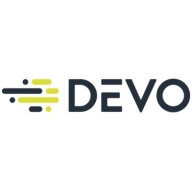

Anomali and Devo are competitive solutions in the cybersecurity domain. Devo has the upper hand due to its comprehensive feature set, superior scalability, and advanced analytics, despite Anomali's advantages in pricing and support.
Features: Anomali offers strong threat detection, robust integration capabilities, and effective threat analysis. Devo provides advanced analytics, superior scalability, and comprehensive data management, emphasizing a broader feature application that surpasses Anomali.
Ease of Deployment and Customer Service: Anomali's straightforward deployment is complemented by responsive customer service. Devo's deployment is more complex but is balanced by effective support ensuring smooth transitions and comprehensive assistance.
Pricing and ROI: Anomali is known for lower setup costs and quicker ROI, making it appealing for those prioritizing cost-effectiveness. Devo requires higher initial investment but offers substantial ROI in the long term due to its enhanced capabilities.

Anomali delivers advanced threat intelligence solutions designed to enhance security operations by providing comprehensive visibility into threats and enabling real-time threat detection and management.
Anomali stands out in threat intelligence, offering an innovative platform that integrates data to identify and analyze threats effectively. It enables teams to streamline threat detection processes and respond to incidents with increased agility. With a focus on accuracy and efficiency, Anomali supports cybersecurity professionals in making informed decisions to safeguard their networks consistently.
What are Anomali's core features?In industries like finance and healthcare, Anomali is implemented to address specific challenges like compliance and data protection. By using this platform, organizations gain the ability to adapt to evolving threats, ensuring robust and adaptable security postures tailored to industry demands.
Devo is the only cloud-native logging and security analytics platform that releases the full potential of all your data to empower bold, confident action when it matters most. Only the Devo platform delivers the powerful combination of real-time visibility, high-performance analytics, scalability, multitenancy, and low TCO crucial for monitoring and securing business operations as enterprises accelerate their shift to the cloud.
We monitor all Security Information and Event Management (SIEM) reviews to prevent fraudulent reviews and keep review quality high. We do not post reviews by company employees or direct competitors. We validate each review for authenticity via cross-reference with LinkedIn, and personal follow-up with the reviewer when necessary.